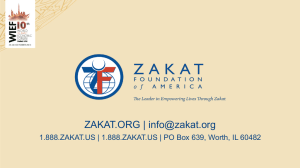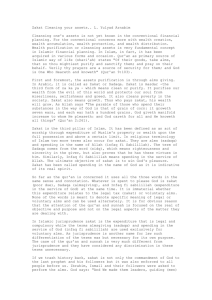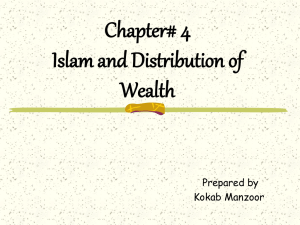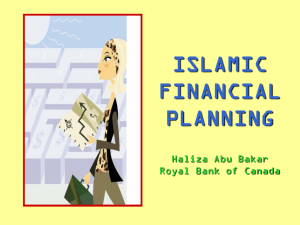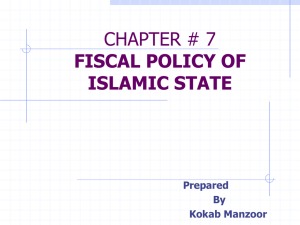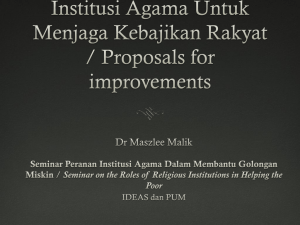lec4-introductiontozakat
advertisement
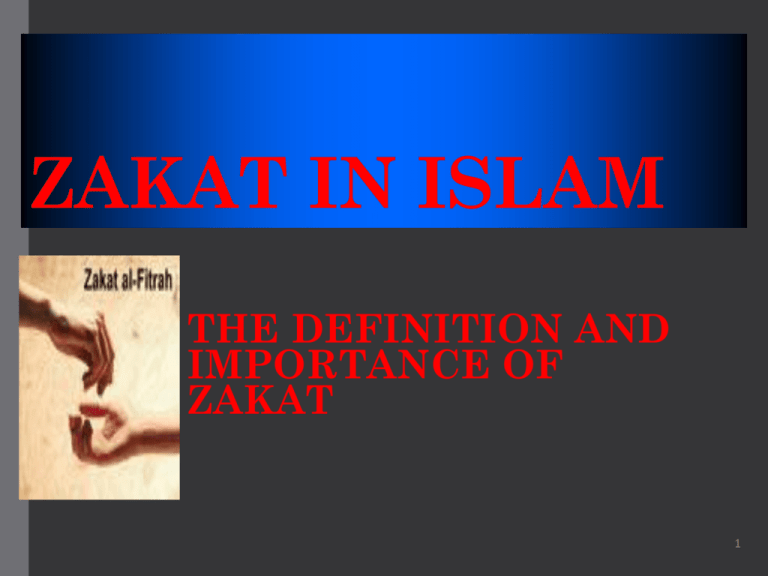
ZAKAT IN ISLAM THE DEFINITION AND IMPORTANCE OF ZAKAT 1 Presentation outline Definition The of zakat importance of zakat Conditions People for zakat entitle to receive zakat Methods to determine the sources of zakat 2 Islamic Financial Planning includes: Savings Zakat Planning Debts – Financing & Credit Cards Investment Takaful Estate Planning Islamic Financial Planning includes: • Discipline of wealth management: Protect Preserve Accumulate Distribute Main difference between saving in Islamic banking & conventional banking? ABSENCE OF INTEREST! • Profit instead of interest! • So how does it work? • Concept of Guaranteed Custody or Profit Sharing • Profit rate is not fixed; depends on the returns of the investment (ROI) INTEREST vs PROFIT INTEREST PROFIT Rate based on the amount of money involved Rate based on the amount of profit obtained Payment is fixed Distribution depends totally on the profitability Amount does not increase even Distribution of profit increases if profit obtained manifold in accordance to the amount of profit obtained SAVINGS : ISLAMIC PERSPECTIVE • Islam does not favour excessive spending Execessive spending is HARAM • Nor does it favour hoarding (penimbunan) of money. • Therefore we need to find the right balance : Spend, Donate, Save Why Savings.......???! • Basic Needs – Health, Food, House, Vehicle, etc. • Zakat (Wajib) • Pilgrimage/Hajj (WAJIB) • Umrah (SUNAT) • Qurban (SUNAT) • Peace of Mind (HARUS) • Financial Independence • Aid for Others (SUNAT) • Charities (SUNAT) The History of zakat payments • Prior to Hijrah, zakat is only compulsory to those wealthy people who are close with the Prophet s.a.w. • At that time, the obligation to pay zakat is based only on their awareness, willingness, discretion. • An organized system of zakat (for instance having the conditions for nisab, rate and haul ) was only applied after the 2 nd year of Hijrah. Definition of zakat • It is considered to be a personal responsibility for Muslims to ease economic hardship for others and eliminate inequality. • It is obligatory for all who are able to do so. • Growth (in goodness) or increase, purifying or making pure of one’s wealth. 10 Definition of zakat • Literally cleansing or purifying of something from dirt or filth (cleaning) Praise, growth and increase References: Dr Yusof Qardawi • Theologically Spiritual purification resulting from paying zakat • Legally / Syariah Transfer of ownership of specific wealth to specific individual (s) under specific conditions Religious payment made by a Muslim from his wealth or income or business or crops or animals in the form of money or crops or animal according to certain rate to the zakat authority that is Pusat Pungutan Zakat (PPZ). The Importance of Zakat One of the five pillar of Islam Avoid 1. Syahadah - is a statement professing monotheism and Muhammad as God's messenger. 2. Solat - Pray 5 times a day 3. ZAKAT- giving is the practice of charitable giving by accumulated wealth 4. Sawm / Siyam – Fasting in the month of Ramadhan 5. Hajj - is a pilgrimage that occurs during the Islamic month of Dhu al-Hijjah to the holy city of Mecca, Muslims based on stinginess Encourage As accepting donations a mean to express thanks to Allah Establish sympathy and avoid jealousy 12 Zakat from the perspective of the Islamic Law • Zakat is an important duty for Muslim as mentioned in the Al-Quran: "Keep up prayer and pay zakat". • While prayer is a physical form of worshipping Allah, zakat is a material form. • Zakat is compulsory : "Take from their wealth charity (alms) to purify them and to cleanse them thereby, and pray for them." [At-Taubah: 103] Dalil of zakat • It is considered to be a personal responsibility for Muslims to ease economic hardship for others and eliminate inequality. • It is obligatory for all who are able to do so. • Growth (in goodness) or increase, purifying or making pure of one’s wealth. 14 Dalil in Hadith In one hadith from Bukhari, Abu Hurairah (r.a.) narrated the Prophet SAW said: that "Whoever is made wealthy by Almighty Allah and does not pay the zakat of his wealth, then on the Day of Resurrection his wealth will be made like a bald-headed poisonous male snake with two black spots over the eyes. The snake will encircle his neck and bite his cheeks and say, 'I am your wealth, I am your treasure'. " Like prayer, Zakat is from amongst the basic principles of Islam and not paying your Zakat is a major sin. Allah (SWT) said, “He [Pharaoh] will go before his people on the Day of Judgment, and will lead them into the Fire.” (Surah Hud : 98) Allah (saw) warns those who refuse to pay the Zakat: Allah (SWT) tells us in the Quran: “They who hoard up gold and silver and spend them not in the way of Allah, Announce to them a painful torment O Muhammad (saw) On the day when it all will be heated in the fire of hell, and their foreheads and their flanks and their backs will be branded with it, (and it will be said to them). This is the treasure which you hoarded for yourself, now taste of what you used to hoard.” (At Taubah:34-35) The first Muslim Caliph Abu Bakr AsSiddiq (r.a.), said: "By Allah (SWT), if they refuse to pay me (even) a bridle which they used to pay the Messenger of Allah (pbuh), then I will fight them because of their refusal." [Muslim] In another hadith by Abu Dawud, the prophet s.w.t. said: “Allah has made zakat obligatory simply to purify your remaining property, and He made inheritances obligatory that they might come to those who survive you.” The main aims of zakat The worship to Allah for all His bounties to mankind •Al-Baqarah: 267 “Oh ye believe! Give of the good things which ye have (honorably earned). And of the fruits of the earth which we have produced for you..” Assist the poor and the needy •Al-Dzariyat: 19 “and their wealth and possessions (was remembered) the right of the (needy)..” •Act as a mechanism to distribute wealth Purify one’s heart and self from being stingy •Al-Taubah: 103 “Of their goods take alms. That so thou mightiest purify and sanctify them..” 21 CONDITIONS FOR ZAKAT 1. Islam. 2. Wise. 3. Genuinely owned-owner’s asset or asset free of claims by others. 4. Productive assets -capable of generating profit or revenue and net cash inflows:Cash in hand,Cash at bank,Stocks, shares, bonds, and securities,Inventories of finished goods, Rentals, Net Receivables. 5. Surplus assets- its value must equal to or above a minimum zakat-able(nisab). 6. Full year’s possession (Haul). 7. Fullfil the nisab- a given quantity for the period of an entire year. People Eligible to pay Zakat Muslim Independent Absolute ownership Nisab Haul Purpose of business 23 1. People Entitle to Receive Zakat / Benefeciaries of Zakat The Needy/ Poor/Fakir / Fuqara’ - Income is less than 50 percent of daily needs. 2. Miskin (Masakin) - Just sufficient to finance basic needs. 3. Amil - The one with authority / responsible to collect zakat. 4. Muallaf - Individual who convert to become Islam. 5. Fisabilillah - Individual involve with activities to defend and strengthen Islam. 6. Ibnu Sabil - Refugees, homeless, Orphanage Muslim. 7. Gharmin - Suffered many debt and unable to settle them. 8. Riqab – Slave, after release from the owner. Discussions on the ISSUES: Are there 8 or 7 Benefeciaries??? Some states in Malaysia have only 7 beneficiaries since nowadays there are no more slaves (captives). However, there are other states which still maintain the number of beneficiaries of 8 people. The reason - because it is stated in the Holy Quran that there are 8 beneficiaries of zakat. Due to that, ar-riqab is implied as zakat for those who would like to free themselves from ignorance for instance zakat paid to people who would like to further their studies Conditions for becoming AMIL Muslim Pious person (orang soleh) Mukallaf (competent person who is in full possession of his faculties) A freedom man (not a slave) A fair and just person Does not come from the descendants of the Holy Prophet (PBUH) Trustworthy Is not a blind person Is not a deaf person Male MUKALLAF • Mukallaf ialah seorang yang telah mencukupi syarat untuk diberikan taklif Syarak (yakni tuntutan dan kewajipan Syarak). • Orang yang mukallaf wajib mematuhi ketetapan agama dan setiap perbuatan dan perlakuannya tertakluk dengan hukum yang telah ditetapkan oleh agama sama ada wajib, haram, harus dan sebagainya tadi. • Syarat-syarat mukallaf ialah: 1. Telah sampai umur (yakni baligh) 2. Memiliki akal yang waras 3. Sampai dakwah kepadanya 4. Sempurna pancaindera, khususnya penglihatan atau pendengaran. Methods to determine the sources of zakat Qiyas Wealth Al-Nama Binafsih Al-Mal al-Nami Favour the poor and the needy QIYAS A method that will be used by the Islamic jurists and scholars in determining the shariah practice if the subject /case is not mentioned in the Holy Al-Quran, Hadith or consensus (ijmak). Qiyas is a practice to imply a subject with an existing shariah treatment. The use of Qiyas in zakat is encouraged and it has been widely practised by the Islamic jurists. For instance, employment income is subject to zakat because it is similar to gold and silver. Therefore, the rate and the haul are equivalent to the rate and haul of zakat on gold and silver WEALTH Taken from several hadith : For instance, as narrated by Mu’az bin Jabal, the holy Prophet s.a.w had instructed his amil to inform the Yemen people that zakat must be paid by the wealthy people to be distributed to the poor and the needy. Due to this, there is an opinion that says zakat is payable on all wealth, irrespective of the physical form of the wealth. Al-Nama Binafsih This is a method to zakat wealth based on the concept of “productive wealth expansion” Those wealth or property which could in nature expand or grow by themselves for instance the agricultural produce such as paddy will fall under this category of wealth. There is no haul condition to be fulfilled for this type of wealth. Zakat is payable once the wealth is gained and the quantity is enough to meet the nisab. Imam Nawawi and some Islamic scholars such as Ibn Abbas, Ibn Mas’ud and Muawiyah for instance suggest that zakat on employment should follow the method of Al-Nama Binafsih. Thus, according to them zakat on employment income is payable on the day it is received provided that it meets the nisab. The zakat is imposed based on the method it is gained and not the type of wealth (even though the wealth is received in the form of money) Al-Mal al-Nami This is another method to zakat wealth based on the concept of “productive wealth expansion”. However, it is imposed on wealth which is gained from property or wealth which could not grow by itself for instance like business wealth. Therefore, zakat is ony payable when it meets the haul and the nisab. For instance zakat on business income will only become payable if it meets the haul and nisab. Favour to the Poor and Needy This principle is being used by the scholars if there are two reasons from two different schools of thought to pay zakat on the same wealth at the same time. Therefore, the approach is to choose the method that will favour the poor and the needy For instance, when there is taraddud which means argument due to similarity or ambiguity between two wealth such as should the rate of zakat for money be based on qiyas on gold or qiyas on silver? Cont… - Favour to the Poor and Needy The jurists conclude that it is better to base on silver since the value is higher and there is no disagreement on the nisab of silver that subject to zakat Reared animals for instance could fall under either zakat on reared animals (al-sa’imah) or zakat on business income (al-tijarah). In this case, normally the jurists will choose zakat on business income rather than zakat on reared animals because it favours more the poor and the needy.
